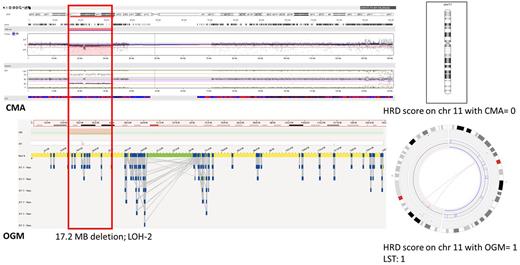Abstract
Introduction:
The inability of a cell to repair the double-stranded breaks because of a defective homologous recombination repair (HRR) pathway results in Homologous Recombination Deficiency (HRD). The defective DNA repair leads to genomic instability and tumorigenesis, which has a characteristic scar predictive of the HRD phenotype. The presence of HRD has been found to make tumors sensitive to ICL-inducing platinum-based therapies and poly(adenosine diphosphate [ADP]-ribose) polymerase (PARP) inhibitors (PARPi). However, there has been limited investigation of HRD phenotype in hematological malignancies, and herein, we aim to evaluate HRD phenotype using Optical genome mapping (OGM) technology in comparison to large gene next-generation sequencing (NGS) panel.
Methods:
This retrospective study included the analysis of 60 hematological malignancy samples that were evaluated with a 523-gene next-generation sequencing (NGS) panel and OGM. The HRD scores were calculated using a combination of three HRD signatures that included loss of heterozygosity (LOH), telomeric allelic imbalance (TAI), and large-scale transitions (LST).
Results:
In the 60 hematological malignancy cases analyzed with OGM and 523-gene NGS panel, the HRD scores were 11 (±9.8) with OGM compared to 2.4 (±3.8) with 523-gene NGS panel. OGM detected 67% additional structural variants that resulted from HRD in these cases.
Conclusion:
This study highlights the HRD scars that are missed by current technologies used for accessing HRD phenotype and presents OGM as an alternative tool with high resolution and sensitivity to accurately assess the HRD phenotype. We recommend the use of OGM for HRD phenotype evaluation as the most sensitive method, that could potentially lead to the differentiation of tumors with or without HRD phenotype in the ongoing clinical trials.
Disclosures
Kota:Xcenda: Honoraria; Novartis: Honoraria; Incyte: Honoraria; Ariad: Honoraria; Pfizer Inc: Honoraria, Research Funding. Kolhe:Perkin Elmer: Honoraria, Research Funding; Agena: Honoraria, Research Funding; Qiagen: Honoraria, Research Funding; Cepheid: Honoraria; PGDx: Honoraria, Research Funding; Illumina: Research Funding; Bioanano INc: Honoraria, Research Funding, Speakers Bureau.
Author notes
Asterisk with author names denotes non-ASH members.


This feature is available to Subscribers Only
Sign In or Create an Account Close Modal